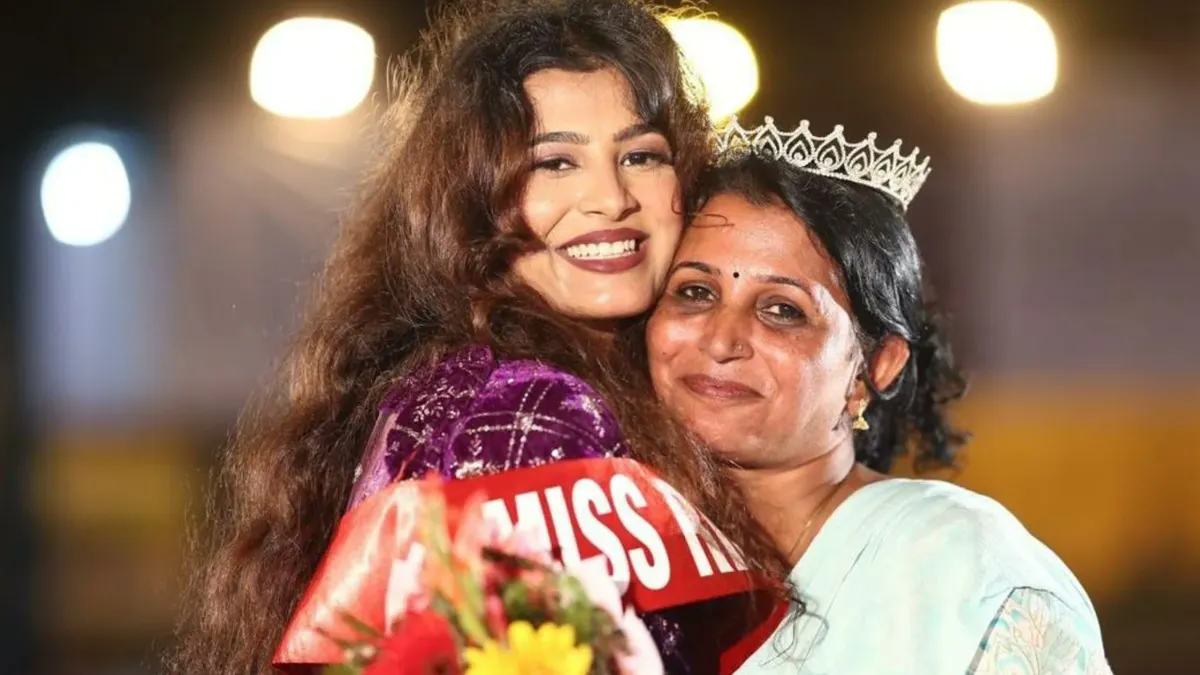In a world where women are often judged by what they wear, Muskan Sharma, a young woman from Uttarakhand, India, has become a symbol of courage, dignity, and determination. Her powerful stand against moral policing not only inspired millions but also led her to win the Miss Rishikesh 2025 beauty pageant — a victory that felt like Miss Universe to her.
This is not just a story about a beauty contest; it’s the story of a woman who stood up for her rights, challenged hypocrisy, and proved that confidence and conviction can be far more powerful than prejudice.
🚨🇮🇳MISS RISHIKESH 2025: MUSKAN SHARMA’S COURAGE CROWNED AFTER STANDING UP TO MORAL POLICING
— Info Room (@InfoR00M) October 14, 2025
Muskan Sharma, 23, from Uttarakhand, won the Miss Rishikesh 2025 crown after boldly confronting men who tried to shame contestants for wearing western outfits.
🔹A viral video captured… pic.twitter.com/teV5Ud39mj
A Viral Confrontation That Sparked a Nationwide Conversation
Just a day before the Miss Rishikesh 2025 pageant, a video from the contestants’ rehearsal session went viral. The footage showed Muskan Sharma boldly confronting a man named Raghavendra Bhatnagar, a local leader from a Hindu outfit called Rashtriya Hindu Shakti Sangathan.
Bhatnagar stormed into the venue, objecting to the contestants’ western-style dresses. He accused them of disrespecting “Uttarakhand’s culture” and told them to “go back home.”
But Muskan didn’t back down. In the video, she calmly yet firmly replied, “Why don’t you shut the shops that sell western clothes if they are against our culture?” She then added that there were far greater issues to fight — such as alcoholism and substance abuse — which deserved attention far more than women’s clothing.
Her words struck a chord. “There’s a shop outside that sells cigarettes and alcohol. Why don’t you close that first? Then I’ll stop wearing these clothes,” she told him fearlessly.
The man snapped back, “Don’t tell me what to do.”
To which Muskan replied, “If you have the right to choose, so do we. Our opinions matter as much as yours.”
Her confidence and composure turned the confrontation into a viral moment across India, with many calling her the new voice of young Indian women.
The Courage Behind the Crown
For Muskan Sharma, this debate wasn’t premeditated or premeditated—it was spontaneous. She told the media, “I could see my dreams crumbling before my eyes. All I could think about was—will this beauty pageant still happen? Will my hard work go to waste?”
Her courage paid off. The event went ahead as scheduled, and the very next day, Muskan was crowned Miss Rishikesh 2025.
“When my name was announced, I was shocked for three seconds,” she recalled. “But then I felt proud. It was a small pageant in a small town, but to me, it felt like winning Miss Universe. It was a double victory — for myself and for women everywhere.”
The Setting: Rishikesh – City of Spiritual Peace
The incident took place in Rishikesh, a serene city nestled in the foothills of the Himalayas, known for its yoga retreats, ashrams, and spiritual calm. It’s also a major pilgrimage site on the banks of the sacred Ganga river.
Ironically, Rishikesh has always welcomed tourists from around the world, many of whom wear western outfits freely. “You see tourists in shorts and dresses here all the time, and no one says a word,” Muskan said.
That’s what made the incident even more unusual — and highlighted how moral policing often targets Indian women selectively while ignoring foreigners or men.
Moral Policing and the Double Standards Around Women’s Clothing
India’s debate over women’s clothing is not new. In many parts of the country, what a woman wears is still seen as a reflection of her character or “values.”
From colleges enforcing strict dress codes to village councils banning jeans, countless women have been harassed or shamed for their attire.
In one incident, a 19-year-old student in Assam was forced to wrap a curtain around her legs for wearing shorts during an exam. In another, a teenage girl was allegedly murdered by her family for wearing jeans.
These disturbing examples show how patriarchal thinking continues to dictate what women can or cannot wear — even in 2025.
“Who Are You to Judge Me If My Parents Don’t?”
In the viral clip, Muskan Sharma can be heard questioning Bhatnagar’s authority to judge her. “Who are you to comment on my clothes if my parents allow me to wear them?” she asked him boldly.
This simple but powerful statement captured the essence of her stand — that a woman’s autonomy and choices should be respected.
Her calm yet firm approach resonated with millions of Indians, especially young women who saw in her a reflection of their own struggles for freedom and respect.
The Legacy of Indian Beauty Pageants
Beauty pageants have long been a part of India’s cultural and entertainment landscape. The country’s fascination with pageantry skyrocketed in 1994 when Sushmita Sen won Miss Universe and Aishwarya Rai won Miss World in the same year.
Their success inspired a new generation of Indian women to dream beyond traditional boundaries. Later, Priyanka Chopra, Lara Dutta, and Diana Hayden carried that torch forward — proving that pageants could be a launchpad for global success.
For small-town aspirants like Muskan Sharma, such success stories are not just glamorous dreams — they are real examples of empowerment and confidence.
The Real Issue: Freedom, Not Fashion
In a sharp commentary in The Hindustan Times, journalist Namita Bhandare pointed out the hypocrisy of moral policing. She noted that no one objects to the Mr. Rishikesh contest where men walk the ramp in minimal clothing.
“The issue is not clothes,” Bhandare wrote. “The issue is freedom and aspiration. How dare these young women from small towns aim for a platform that could change their lives? How dare they challenge patriarchal limits of honour and shame?”
Muskan’s defiance thus became symbolic — not just about western dresses, but about the right of women to dream freely and define their own dignity.
A Daughter’s Strength, A Mother’s Legacy
Behind Muskan Sharma’s confidence stands a pillar of strength — her mother. “The crown is as much my mother’s as it is mine,” she said emotionally. “Without her, I wouldn’t be the person I am today.”
Her mother taught her to stand up for what’s right, to speak without fear, and to never give up on her dreams.
This emotional foundation gave Muskan the strength to face public confrontation, viral scrutiny, and still walk the ramp with her head held high.
The Symbol of a New Generation
Muskan’s story symbolizes a generational shift in India — where young women from smaller towns are no longer afraid to speak up or chase ambitious dreams.
Her viral video wasn’t just a clash of opinions; it was a mirror reflecting modern India’s ongoing battle between tradition and change, control and confidence.
For many, Muskan Sharma represents the voice of a fearless generation that refuses to be silenced.
“If You Believe You’re Right, You Can Fight”
When asked how she felt during the confrontation, Muskan admitted she was nervous. “In that moment, I was scared too,” she said. “But I also knew I had to stand up for what was right. If you believe you’re right, you can fight.”
Those words have since become a rallying cry for many women across social media who shared her video, praising her courage and calm.
What’s Next for Muskan Sharma?
After winning Miss Rishikesh 2025, Muskan is already planning her next steps. “Next year, I’ll go for Miss Uttarakhand, and then Miss India,” she said. “After that, I’ll see where life takes me.”
But beyond titles and crowns, Muskan’s real mission is empowerment. “For me, the crown was always secondary,” she said. “What mattered most was encouraging other women to speak up, to stand against injustice, and to believe in themselves.”
Also read: From Armless to Iconic: Sheetal Devi’s Journey to Para Archery Glory
The Broader Message: Empowerment Begins with Self-Belief
Muskan Sharma’s story is not just about defiance — it’s about self-belief. In her journey from a small-town contestant to a national inspiration, she proved that dignity and courage can outshine any crown.
Her victory symbolizes the changing face of Indian womanhood — modern yet rooted, fearless yet graceful.
Every time a woman like Muskan stands up against unfair treatment, it challenges a centuries-old mindset and lights a path for others to follow.
Why Muskan Sharma’s Story Matters
In 2025, when the world is moving rapidly toward equality, stories like Muskan’s remind us that true progress is not measured by technology or wealth — but by how a society treats its women.
Her confrontation with moral policing was not about winning an argument; it was about asserting her right to exist, express, and aspire without judgment.
Muskan Sharma’s calm defiance has turned her into an icon — a symbol of modern Indian womanhood that refuses to bow down to outdated moral codes.
Also read: Anant Ambani Fitness Insights: Expert Reveals Truth About Working Out on an Empty Stomach
Conclusion: The Crown of Courage
Muskan Sharma may have started her journey as just another beauty pageant contestant, but she emerged as something far greater — a voice for change.
Her story is a reminder that courage often comes in quiet moments of conviction, not loud protests. That empowerment begins when a woman simply says, “No, I will not back down.”
As she prepares for future contests and greater stages, Muskan’s legacy is already shining bright — inspiring a new generation of Indian women to walk with pride, speak with confidence, and dream without fear.


















